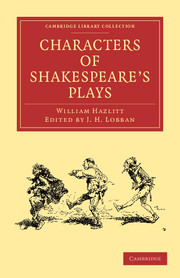Book contents
- Frontmatter
- Preface
- Contents
- Introduction
- Preface
- Cymbeline
- Macbeth
- Julius Cæsar
- Othello
- Timon of Athens
- Coriolanus
- Troilus and Cressida
- Antony and Cleopatra
- Hamlet
- The Tempest
- The Midsummer Night's Dream
- Romeo and Juliet
- Lear
- Richard II
- Henry IV
- Henry V
- Henry VI
- Richard III
- Henry VIII
- King John
- Twelfth Night; or, what you will
- The Two Gentlemen of Verona
- The Merchant of Venice
- The Winter's Tale
- All's Well That Ends Well
- Love's Labour's Lost
- Much Ado About Nothing
- As You Like It
- The Taming of the Shrew
- Measure for Measure
- The Merry Wives of Windsor
- The Comedy of Errors
- Doubtful plays of Shakespear
- Poems and Sonnets
- Notes
Cymbeline
Published online by Cambridge University Press: 07 September 2010
- Frontmatter
- Preface
- Contents
- Introduction
- Preface
- Cymbeline
- Macbeth
- Julius Cæsar
- Othello
- Timon of Athens
- Coriolanus
- Troilus and Cressida
- Antony and Cleopatra
- Hamlet
- The Tempest
- The Midsummer Night's Dream
- Romeo and Juliet
- Lear
- Richard II
- Henry IV
- Henry V
- Henry VI
- Richard III
- Henry VIII
- King John
- Twelfth Night; or, what you will
- The Two Gentlemen of Verona
- The Merchant of Venice
- The Winter's Tale
- All's Well That Ends Well
- Love's Labour's Lost
- Much Ado About Nothing
- As You Like It
- The Taming of the Shrew
- Measure for Measure
- The Merry Wives of Windsor
- The Comedy of Errors
- Doubtful plays of Shakespear
- Poems and Sonnets
- Notes
Summary
Cymbeline is one of the most delightful of Shakespear's historical plays. It may be considered as a dramatic romance, in which the most striking parts of the story are thrown into the form of a dialogue, and the intermediate circumstances are explained by the different speakers, as occasion renders it necessary. The action is less concentrated in consequence; but the interest becomes more aerial and refined from the principle of perspective introduced into the subject by the imaginary changes of scene, as well as by the length of time it occupies. The reading of this play is like going a journey with some uncertain object at the end of it, and in which the suspense is kept up and heightened by the long intervals between each action. Though the events are scattered over such an extent of surface, and relate to such a variety of characters, yet the links which bind the different interests of the story together are never entirely broken. The most straggling and seemingly casual incidents are contrived in such a manner as to lead at last to the most complete development of the catastrophe. The ease and conscious unconcern with which this is effected only makes the skill more wonderful.
- Type
- Chapter
- Information
- Characters of Shakespeare's Plays , pp. 11 - 20Publisher: Cambridge University PressPrint publication year: 2009First published in: 1908

